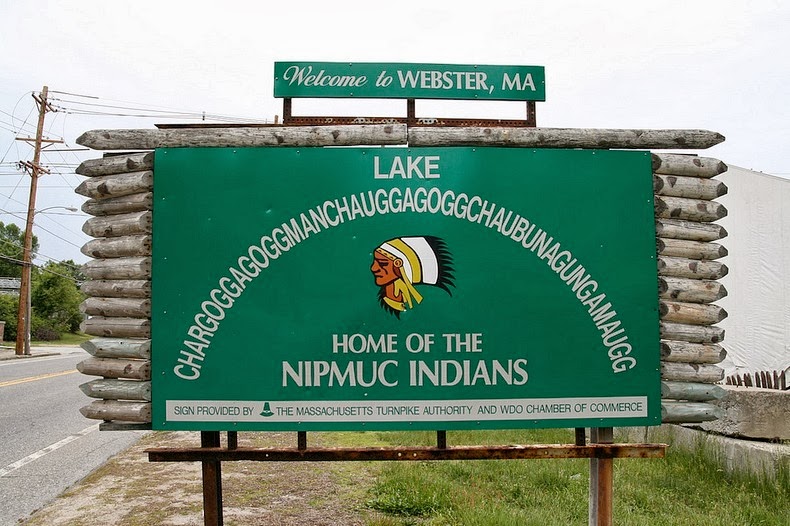The lake has been known, from early times, by various names such as Chabanaguncamogue, Chaubanagogum, and Chaubunagungamaug. Historians agree that all these names bear the same meaning - "Fishing Place at the Boundary". For this great pond, divided by narrow channels into three larger bodies of water, was famed throughout the area and was the central gathering place for the Nipmuc Indians and their friends.

One of the many misspelled road signs. Can you spot the misspelling?
The name came to its current form once the English colonists arrived in the area. At that time an Englishman named Samuel Slater began operating a mill at the nearby village of Manchaug, a corrupted version of “Monuhchogoks”. The Indians started calling the lake Chargoggaggoggmanchoggagogg which meant "Englishmen at Manchaug." Soon after, the name found its way into the map of 1795 that showed the town of Dudley. In 1831, both Dudley and Oxford, which adjoined the lake, filed maps listing the name of the pond as Chargoggagoggmanchoggagogg, but a survey of the lake done in 1830 lists the name as Chaubunagungamaugg, the ancient name.
Then later, someone decided to add the original Indian descriptive name Chaubunagungamaug to the newer name Chargoggagoggmanchoggagogg, and the entire designation becomes "Englishmen at Manchaug at the Fishing Place at the Boundary" or Chargoggagoggmanchauggagogg chaubunagungamaugg.
The late editor of The Webster Times, Laurence J. Daly, once humorously called the lake “You fish on your side, I fish on my side, and nobody fish in the middle.”
The Lake was formed by the retreat of glaciers during the last ice age and is replenished from underwater springs and streams. Visiting the area is a great way to spend some time with nature. There is a hiking trail called the Walkabout Trail in the area with some great views. Tourists often enjoy the swamps around the edges of the lake as good spots to look for wildlife. Swimming and boating are very popular activities on the lake.




Source
